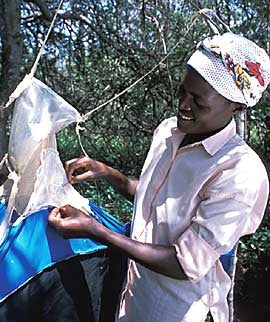Christmas Appeal: How a simple fly trap can save cattle and bring new life for farmers

Tourists who travel the road that leads from Nairobi to the Kenyan coast usually turn into Tsavo, the country's biggest national park, where they can gaze at elephants, lions and impala from the comfort of cushioned Land Rovers. Few look at the villages dotted around the park's boundaries, where farmers graze their livestock on the sparse grasslands.
Twenty years ago, thousands of farmers left the burgeoning populations in the highlands around Nairobi for the low-lying town of Mtito Andei, to make a new start on land the government made available. They brought their livestock and set them out to graze. But within a few years, most animals were dead, killed by a disease known as kisiko, or "spoon", because infected cows became thin and bent over. Musili Mutambuki, 68, moved down to the region in 1974 with 77 cows. Over the first few years, he managed to grow his herd to 400 animals. Then in 1981, after a heavy tsetse attack, disaster struck.
"All of them died," he said. "I gave up and swore never to keep livestock again. I started to make wooden combs to sell." The disease wiped out 100,000 domestic animals a year, a huge blow for communities where livestock was often the only wealth a family had. Across Africa, more than 55 million animals are lost to kisiko every year.
The Intermediate Development Technology group, now known as Practical Action and one of the three charities supported by this year's Independent Christmas appeal, began researching the problem in the 1990s. Kisiko was identified as a strain of trypanosomiasis, or sleeping sickness, spread by tsetse flies from the nearby national park. These flies multiplied in the farmlands, and spread the disease by biting sensitive areas of the cattle's skin.
Practical Action intro-duced fly traps, small tent-like structures, made of blue cotton and mosquito netting, topped with plastic bags. On the ground are plastic bottles, filled with cows' urine and acetone. The flies, attracted to the smell and, oddly, the colour blue, fly towards the bottles and become trapped in the cotton. As they fly up to the light to escape, they are caught in the plastic bags.
In 2000, when local communities began using the traps, 35 per cent of all animals were infected. The 10 traps set up that year caught 75,000 flies in the first seven months. By the next year, the infection rate was down to 6 per cent. "I am glad these traps worked because plastic combs were beginning to take over and no one wanted to buy my wooden ones," Mr Mutambuki said. "Now, slowly, I am beginning to restock, but I only have four cows; still a long way to go."
Local community groups have set up a network of people who build, repair and monitor the traps. They also give advice on where to catch the most flies. Each trap costs about £10 to build and £20 a year to maintain.
Kenya Wildlife Services, which maintains the parks, had promised to give money for traps but, so far, this has not materialised. Instead, the farmers rely on groups such as Practical Action and government departments to help them set up and maintain the traps.
Anna Kioko, who also lost all her animals in 1987, said: "The researchers told us to start trapping the flies and slowly we began to get more livestock. Now I have 11 cows and nine goats. My two sons are men now and just finished college. Without the traps I could not have sent them to school."
Life is still hard for the farmers. The area suffers punishing droughts; the present one has lasted three years and that is slowly killing the livestock saved from sleeping sickness by the fly traps. But for the farmers who came down to start a new life on the plains, the tsetse fly traps give them a livelihood they thought they had lost.
Join our commenting forum
Join thought-provoking conversations, follow other Independent readers and see their replies
Comments
Bookmark popover
Removed from bookmarks